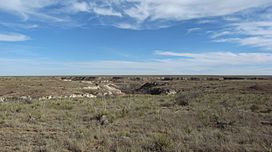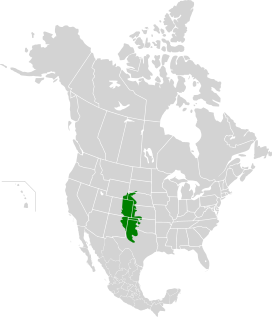Western short grasslands facts for kids
Quick facts for kids Western short grasslands |
|
|---|---|

Canyon in the shortgrass prairie of Buffalo Lake National Wildlife Refuge
|
|
 |
|
| Ecology | |
| Realm | Nearctic |
| Biome | Temperate grasslands, savannas, and shrublands |
| Bird species | 245 |
| Mammal species | 107 |
| Geography | |
| Area | 435,200 km2 (168,000 sq mi) |
| Country | United States |
| States | South Dakota, Wyoming, Nebraska, Colorado, Kansas, New Mexico, Oklahoma and Texas |
| Conservation | |
| Habitat loss | 30.5% |
| Protected | 5% |
The Western short grasslands is a special natural area in the United States. It is a type of ecoregion known as a temperate grassland. An ecoregion is a large area of land or water that has its own unique mix of plants, animals, and climate. This particular ecoregion is known for its short grasses and dry weather.
Contents
Where Are the Western Short Grasslands?
This amazing ecoregion covers a big part of the High Plains. You can find it in several states across the western and central U.S. These include eastern, northern, and central Montana, eastern Wyoming, and western Nebraska. It also stretches into eastern Colorado, western Kansas, and western Oklahoma. You'll also find parts of it in eastern New Mexico and the Texas Panhandle. A tiny bit even reaches into southwestern South Dakota.
The Western short grasslands have a semi-arid climate. This means they don't get much rain. The temperatures are usually warm, and plants have a long time to grow. This climate is different from other Nearctic prairie areas.
Plants of the Grasslands
The main plants you'll see here are grasses. Two types of grass are especially common. They are blue grama (Bouteloua gracilis) and buffalograss (Bouteloua dactyloides). These grasses are tough and can handle the dry conditions. They are important food for many animals.
Animals of the Grasslands
The Western short grasslands are home to many cool animals.
Mammals of the Grasslands
Large mammals like bison (Bison bison bison) roam these lands. You might also spot mule deer (Odocoileus hemonius) and clever coyotes (Canis latrans).
Birds of the Grasslands
Many different birds live here too. Some well-known birds include the Lesser Prairie Chicken and the greater prairie chicken. Smaller birds like the dickcissel and the loggerhead shrike also make their homes here.
Insects of the Grasslands
This ecoregion is special because it has so many different kinds of butterflies. This is partly because it's close to warmer, subtropical areas. The mix of climates helps many different species thrive.
Challenges and Protection
Most of the Western short grasslands are used for farms and ranches.
Threats to the Grasslands
Cattle grazing has changed about 75% of this ecoregion. This is especially true in the southern parts. When too many animals eat the grass in one area, it's called overgrazing. This can cause problems. For example, desert plants like mesquite have started to grow in areas where they didn't before.
Protecting the Grasslands
Even with these challenges, about 40% of the ecoregion is still in good shape. Many areas are protected to keep them healthy. These include:
- Buffalo Lake National Wildlife Refuge in the Texas Panhandle
- Cimarron National Grassland in southwestern Kansas
- Rocky Mountain Arsenal National Wildlife Refuge in central Colorado
- Pawnee National Grassland in northeastern/north-central Colorado
These protected areas help save the unique plants and animals of the Western short grasslands.
 | Leon Lynch |
 | Milton P. Webster |
 | Ferdinand Smith |

